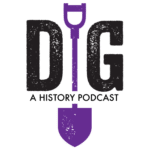<< Hide Menu
AP World History Podcasts
5 min read•july 11, 2024
Eric Beckman
Eric Beckman
Podcasts are a great way for students and teachers to build knowledge. As a World History teacher I always have more to learn, especially as I work to decolonize the curriculum while encouraging critical thinking. I want my students to think complexly; therefore, I need to demonstrate the complexities of history. We are not certain about much of the past, and the stories that we do understanding could have come out differently than they did.
All of this leads to me to podcasts featuring academics who pull back the curtain on the production of historical knowledge and give insights into how historians’ understandings of the past are evolving. Below I highlight four episodes from four of my favorite history podcasts, one for each of the time periods in the new AP World History: Modern course.
Southeast Asia Crossroads
⚡ Watch: AP World History - 🎥 Southeast Asia in the Global Middle Ages

The Center for Southeast Studies at Northern Illinois University (Go Huskies!) produces the excellent Southeast Asia Crossroads podcast. As a "studies" program not all of the episodes are historical, but many are. This year I am committed to adding more Southeast Asian content to my World History classes. SE Asia Crossroads will be a valuable resource.
The episode on Ancient Maritime Trade Networks and the Java Sea Shipwreck with Lisa Niziolek from Chicago's field museum would be useful for students and teachers. The museum owns and studies artifacts from a shipwreck that was carrying Chinese ceramics, among other goods, in the Java Sea. The episode provides useful context from Southeast Asian exchange networks and describes scientific techniques for historical research. Related: A collaborative episode from On Top of the World (a must listen for AP World teachers, in my opinion) and Southeast Asia Crossroads discusses how SE Asia fits into World History courses.
Head on History
⚡ Watch: AP World History - 🎥 The Islamic World, Imperial Art and Architecture, and The Islamic Gunpowder Empires

Historian Ali A. Olomi hosts Head on History, a solo podcast which narrates religious history. The first two seasons explain Islamic history from the beginning through the varied Islams of the early modern world. The episodes include less discussion of historical process than my other favorites, but Olomi's nuanced presentation of religious history and his use of stories as primary sources engage me.
The episode on The Mughals and Indo-Persian Islam is an excellent example of engaging story and explication of details. Olomi includes the familiar story of the Taj Mahal with many artistic expressions that were new to me. This episode situates the Mughals within late medieval-early Modern Central, South, and Southwest Asia. This includes the fascinating story of interactions between Sufi mystics and Buddhist monks. Listeners will benefit from some prior knowledge of this context, including: Sufi, Sunni, and Shi'ite Islams; and, Ottoman, Safavid, and Mongol Empires. All but the last can be learned from earlier episodes. This episode will be a terrific resource for teachers looking to add to their discussions of the Mughals with the new time frame for AP World History: Modern. Related: Popular Sufism, Ottomans, and Safavids; which preceded the Mughal episode.
DIG: A History Podcast
⚡ Watch: AP World History - 🎥 Atlantic Revolutions and Imperialism

Four women historians produce the scholarly, but not stuffy DIG podcast. The episodes all include transcripts which make DIG an excellent choice for teachers who assign podcast episodes. Not all episodes are safe for work or school, because of frank content, however. But, this is usually quite clear from the descriptions.
Slave Rebels and Resistance in the Revolutionary Caribbean is an episode that could be very useful in class. I have provided links to it as one of several resources for an online discussion, and many students cited it in their posts. The episode provides succinctly summarizes the Haitian Revolution (no mean feat) and describes several other examples of resistance from around the region, including Jamaica, Martinique, and Barbados. Students could use any of these less famous rebellions as evidence in a free response-question; teachers could add one to a lecture or activity on the Age of Revolutions. Related: Hearts of Darkness: Victorian Imperialism and Travel of the African Continent blends biographies with a systemic treatment of colonialism.
Historias
⚡ Watch: AP World History - 🎥 Cold War and Decolonization

A group of scholars from the Southeastern Council of Latin American Studies produces the Historias podcast. Since it is from a Latin American Studies Association, not all of the episodes relate to history. But, those that do include discussions of historiography and archival search. Most episodes involve a host(s) and guest(s) discussing the recent scholarship
Episode 28 on Latin America’s Cold War, for instance, features two historians explaining the state of the field, including when the Cold War began in Latin America. This episode was especially interesting to me, because it suggested how the Mexican Revolution played a key role in ideological conflicts in the region. Related: Episode 40. Aaron Coy Moulton on Right-wing Caribbean Dictators is on a narrower topic but includes a great research story and stresses how Latin Americans acted independently from the US at times.
More for Teachers
All of the episodes above could be useful for teachers and for ambitious students. As mentioned above, I consider On Top of the World with historians Matt Drwenski and Dave Eaton to be a must listen for AP World teachers in particular. The show is aimed squarely at teaching the World History survey; and, thus, episodes bring together historiography and pedagogy. Drwenski has taught AP World and Eaton teaches its equivalent at Grand Valley State University (Go Lakers!). I loved the book American Baroque, discussed on this episode with its author Molly Warsh. If you can not make the time to read a book about pearls in early modern World History, I understand, but also encourage you to spend a few minutes listening to Warsh explain how and why historical knowledge should be constructed.
The five podcasts describe here is only a partial list of my favorites. Many others can help AP World History students and teachers to think complexly about the past and how we learn about it. I encourage teachers and students to describe their's in the comment. Happy listening!

© 2024 Fiveable Inc. All rights reserved.